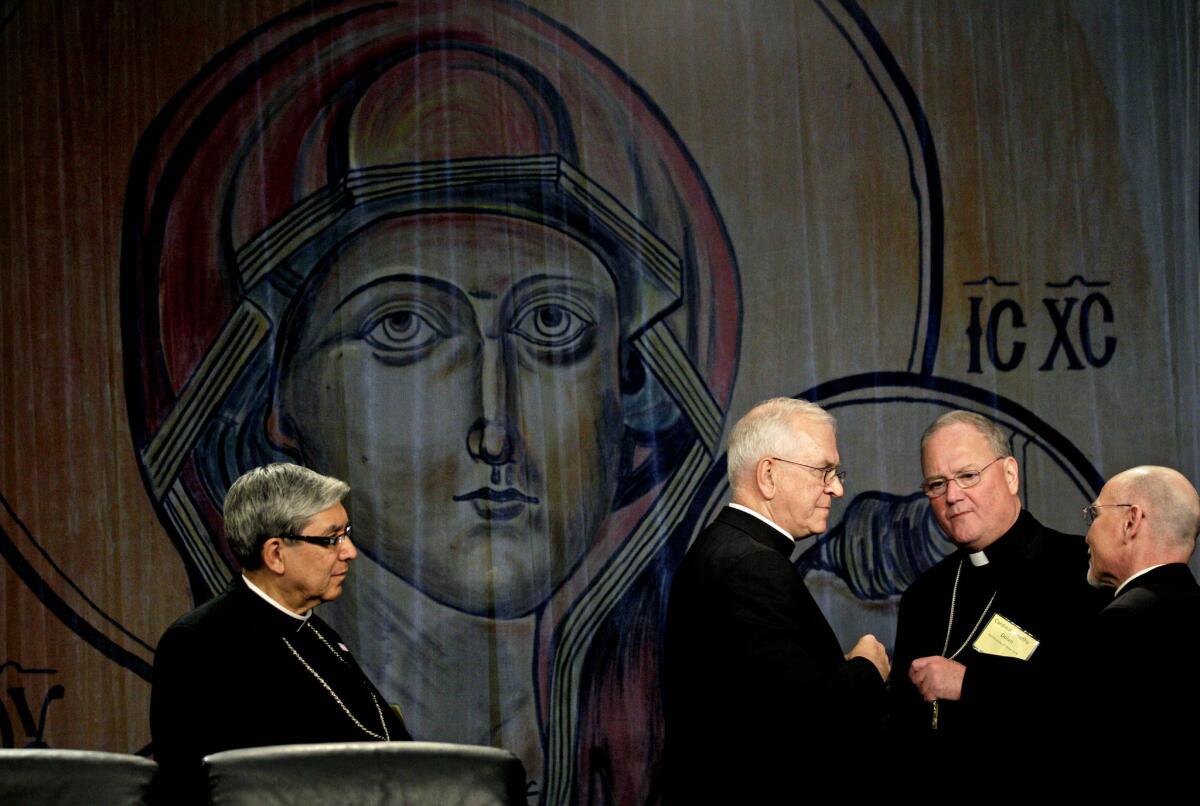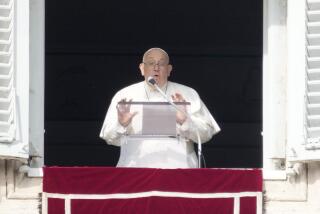Catholic bishops cry wolf

When the Supreme Court struck down a section of the Defense of Marriage Act, the president of the U.S. Conference of Catholic Bishops said it was a “tragic day for marriage and our nation.” But the bishops go further, arguing that when the state legalizes same-sex civil marriage, “conflict results on a massive scale between the law and religious institutions and families.... Religious liberty is then threatened.”
The bishops are equally alarmist about what they see as the threat to religious freedom posed by the Obama administration’s requirement that employee health plans — including those at religious colleges and hospitals — include contraception services. On Tuesday, Archbishop William E. Lori of Baltimore, the bishops’ spokesman on religious freedom, joined other religious leaders in warning that the mandate “continues to breach universal principles affirmed and protected by the U.S. Constitution and other federal laws.”
These indictments are excessive. Neither progress toward same-sex marriage nor the contraceptive mandate threatens the broad protections of religious liberty for which this country is renowned.
FULL COVERAGE: Prop. 8 and DOMA
Even the bishops don’t argue that legalization of same-sex civil marriage interferes with the church’s decision about whom it will marry in a religious ceremony. Instead, they suggest that the church’s freedom might be compromised in other ways: It might be forced to employ individuals in same-sex civil marriages or provide spousal benefits to same-sex couples or be excluded from government benefits for opposing same-sex marriage. They also wonder if religious preachments against same-sex marriage might be punished as hate speech.
The last objection is just silly; no preacher is going to be imprisoned for arguing that “God created Adam and Eve, not Adam and Steve.” As for the others, the Roman Catholic Church can’t be required to ordain to the priesthood people in same-sex marriages — or opposite-sex marriages, for that matter — any more than it can be forced to ordain women despite laws against sex discrimination. On the other hand, if a Catholic university or hospital employs and serves non-Catholics, requiring it to recognize the civil (not religious) marriages of same-sex couples is not a violation of religious freedom any more than is requiring such institutions to comply with other civil laws.
Likewise, the health insurance rules draw a distinction between churches and other houses of worship, which are totally exempt from the contraceptive mandate, and religiously affiliated schools and charities that serve and employ people of all faiths. Even then, the administration has taken pains to spare the latter from directly paying for contraceptive services. Instead, employees will receive contraception coverage from an insurance company or, if the employer is self-insured, from a third-party administrator.
That’s a fair concession, but it’s not enough for Lori and the other religious leaders; they want the government to provide an exemption for institutions and individuals with religious objections to “enabling access” to contraceptives. That’s a loose standard that, if taken to its logical extreme, would allow employers to dock their employees’ pay in the amount of what it would cost them to purchase contraceptives.
The bishops also go too far in arguing that there should be an exemption for individual employers with religious objections to contraception. Unfortunately, this notion has received some support from federal judges. Last week, a federal appeals court in Denver ruled in favor of Hobby Lobby, a “biblically founded” chain of craft stores with 13,000 full-time employees eligible for health insurance.
The appeals court treated seriously the notion that the company was protected by the Religious Freedom Restoration Act, a 1993 law that allows a “person” — not a company — to disobey a generally applicable law if it substantially burdens the free exercise of that individual’s religion. The government can force compliance, however, if the law serves a compelling government interest and is the least restrictive means of furthering that interest. The healthcare law and the rules implementing it easily pass those tests.
Catholic bishops and other religious leaders should cry foul when the civil authorities violate freedom of conscience. In these cases, however, they are crying wolf.
More to Read
A cure for the common opinion
Get thought-provoking perspectives with our weekly newsletter.
You may occasionally receive promotional content from the Los Angeles Times.










